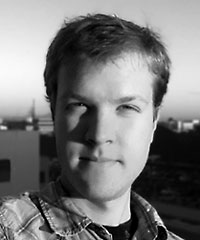News
SDSC Graduate Student Awarded NVIDIA Graduate Fellowship
Published March 26, 2012
|
Benjamin Madej |
A graduate student working in the Walker Molecular Dynamics laboratory at the San Diego Supercomputer Center (SDSC) at the University of California, San Diego is a recipient of the 2012-2013 NVIDIA Graduate Fellowship Program award for his innovative molecular dynamics research using GPU (graphics processing unit) computing.
Benjamin Madej, a chemistry and biochemistry Ph.D. student at UC San Diego, will receive a $25,000 scholarship to further his research. Madej received his Bachelor of Science in biomedical engineering from Washington University in St. Louis, Missouri, and is currently working on new methods for developing force fields used in molecular dynamics software, specifically the AMBER MD package.
Madej’s research proposal focused on not only improving the AMBER Molecular Dynamics GPU engine, but extending the use of GPUs to multiple facets of molecular dynamics development and workflow for new drug discovery.
“We are proud of Ben’s achievement in being awarded this prestigious scholarship and recognition,” said SDSC Director Michael Norman. “It is very gratifying to see such a high level of accomplishment in computational science as Ben pursues his doctorate here at UC San Diego.”
“This fellowship is a testimony to Ben's past work, the importance of GPUs at the frontiers of molecular dynamics and drug discovery, and recognition of the future potential of his contributions to science. The GPU revolution is transforming the field and this fellowship provides vital support for us to continue this cutting-edge research,” said Ross C. Walker, an assistant research professor with SDSC and head of the Walker Molecular Dynamics laboratory. Walker also is an adjunct assistant professor in UC San Diego's Department of Chemistry and Biochemistry, as well as an NVIDIA CUDA Fellow.
The NVIDIA Graduate Fellowship Program provides funding to Ph.D. students who are researching topics that will lead to major advances in the graphics and high-performance computing industries, and are investigating innovative ways of leveraging the power of GPUs. Recipients not only receive crucial funding for their research, but are provided access to NVIDIA products, technology, and expertise.
“This year the NVIDIA Foundation joined in our search for top Ph.D. students who are investigating innovative ways to leverage the power of the GPU, especially those that will ultimately benefit humanity,” said Chandra Cheij, NVIDIA’s research program manager. “Congratulations to Ben and SDSC for this significant achievement.”
SDSC’s Walker Molecular Dynamics lab is focused on computational chemistry, molecular biology, and high-performance computing. The lab is particularly interested in the development of efficient algorithms for parallel computation of Quantum Mechanical and hybrid Quantum/Molecular Mechanical (QM/MM) techniques, as well as improvements in the computational efficiency and accuracy of classical MM dynamics simulations.
Practical applications of the techniques developed in the WMD lab include the development of next-generation viral inhibitors, improvements in bio-ethanol production, drug discovery, and advanced algorithms for high performance of scientific application on supercomputers. The lab is also closely involved with the development of the AMBER molecular dynamics software.
The WMD lab is funded through a combination of grants from the National Science Foundation (NSF), the University of California, NVIDIA, Microsoft, and the UK Foreign and Commonwealth Office, Department for Business, Innovation and Skills.
About SDSC
As an Organized Research Unit of UC San Diego, SDSC is considered a leader in data-intensive computing and cyberinfrastructure, providing resources, services, and expertise to the national research community, including industry and academia. Cyberinfrastructure refers to an accessible, integrated network of computer-based resources and expertise, focused on accelerating scientific inquiry and discovery. SDSC supports hundreds of multidisciplinary programs spanning a wide variety of domains, from earth sciences and biology to astrophysics, bioinformatics, and health IT. With its two newest supercomputer systems, Trestles and Gordon, SDSC is a partner in XSEDE (Extreme Science and Engineering Discovery Environment), the most advanced collection of integrated digital resources and services in the world.
Media Contacts:
Jan Zverina, SDSC Communications
858 534-5111 or jzverina@sdsc.edu
Warren R. Froelich, SDSC Communications
858 822-3622 or froelich@sdsc.edu
Categories
Archive
Related Links
San Diego Supercomputer Center: http://www.sdsc.edu/
UC San Diego: http://www.ucsd.edu/
Walker Molecular Dynamics lab: http://www.wmd-lab.org/
AMBER: http://ambermd.org/
NVIDIA: http://research.nvidia.com/


